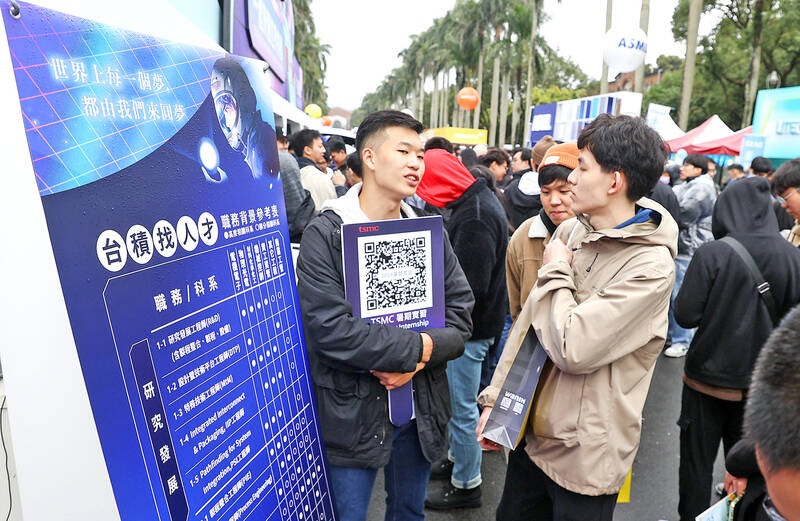


Local companies believe that nearly one-third of all job opportunities would disappear in 10 years due to the rise of artificial intelligence (AI), according to the results of a survey by online job bank yes123 released on Tuesday.
In a survey of 1,016 companies on the labor market’s third quarter outlook, the job bank focused in part on AI’s impact on workers and asked companies what percentage of jobs they felt would be lost to AI’s round-the-clock productivity and high-speed computing prowess.
Respondents felt on average that 29.2 percent of job opportunities would be lost to AI over the next 10 years, but there were no suggestions on what would replace those jobs.
Photo: CNA
The job bank also asked companies to identify the labor-intensive and knowledge-intensive fields which people were most likely to lose their jobs to AI.
Companies said the most likely job to disappear among labor-intensive industries was ticket selling, cited by 54.3 percent of respondents.
It was followed by call center agents (53.6 percent), assembly line workers (52.2 percent), gas station attendants (35.7 percent), and wholesale and convenience store clerks (34.8 percent).
The top five knowledge-intensive jobs likely to disappear the polled companies said were translators (37.2 percent), journalists (36.3 percent), bank clerks (35.2 percent), financial traders (29.1 percent) and insurance agents (28.2 percent).
In addition, 49.8 percent of companies said they are considering adopting automation or AI, a significant increase from last year’s survey result of 42 percent, yes123 said.
Among them, 19.6 percent said that related AI projects are already in progress, with expectations that employees possessing relevant skills would have an average starting salary of at least 31.6 percent higher than others.
Bingo Yang (楊宗斌), a spokesman for yes123, said the job market was heading toward “human-machine collaboration,” or workers directly supported by AI to achieve objectives.
That way, AI can handle tasks that require high precision and repetition, allowing workers to engage in more creative work, Yang said.
The online survey, which was conducted from June 7 to June 20, had a confidence level of 95 percent and a margin of error of 3.07 percent, yes123 said.
Comments will be moderated. Keep comments relevant to the article. Remarks containing abusive and obscene language, personal attacks of any kind or promotion will be removed and the user banned. Final decision will be at the discretion of the Taipei Times.